Impact Report 2021-22


Her Late Majesty Queen Elizabeth II

Patron, 2003-2022
We were honoured when, in 2003, Her Late Majesty Queen Elizabeth II succeeded Queen Elizabeth the Queen Mother as our Patron. Over the 19 years of Her Late Majesty’s patronage, the Queen visited Cumberland Lodge on numerous occasions and met thousands of students and others associated with our work. Her Late Majesty’s final visit was in February 2020, shortly before the pandemic, to meet privately with doctoral students on our Fellowship scheme.
Her Late Majesty’s passing during our 75th anniversary year is therefore of especial sadness to all of us at Cumberland Lodge. We had hoped to celebrate our anniversary with the involvement of our Patron. Sadly, this was not possible. Her Majesty’s death was felt acutely by all of us who live and work in Windsor Great Park, and the local community – including Cumberland Lodge – continues to adjust to changing circumstances after a long and continuous period of stability. At the time of writing, we await news of who will be our next Patron.
2
On 5 August 1947, an announcement appeared in The Times to say that King George VI had granted a former royal residence in Windsor Great Park as the home for an experimental educational foundation, then called St Katharine’s. Its purpose was to provide a space for university students and graduates from across varying academic disciplines and the Commonwealth to study and discuss “the nature of man and society”.
The idea was a response to the situation in the late 1930s, as explored in the book Darkness Over Germany, written by Amy Buller. In it, Buller analyses how National Socialism took hold in Germany prior to the Second World War. Her vision was to set up a place where students could meet to discuss the moral issues of the day. The book came to the attention of the King and Queen, who helped Buller to set up the foundation.
This experiment has clearly worked, and its objectives are as relevant today as they were in 1947. This educational charity, today known simply by the name of its home, Cumberland Lodge, is now 75 years old and looking to its future with renewed vigour to fulfil its purpose.
Our 75th anniversary and the pandemic, which restricted what we could do in terms of residential events, provided an opportunity to reflect on our past, our origins, and our objectives. While our original purpose, to foster critical


Foreword
thinking and constructive dialogue underpinned by values to sustain an open society, remains fundamental to what we do, the trustees and the staff have worked together to consider how best to deliver these objectives even more effectively and to increase our impact.
These deliberations resulted in a new five-year strategy which will inform the next phase of our work. While we will continue to provide space for young people to think deeply about the critical issues of our time, to equip them to navigate our turbulent world which raises many ethical dilemmas, and to help to build a movement for social progress, our future work will be more focused on how best to achieve our objectives in a much more polarised world with ever increasing digital connectivity.
The Rt Hon the Baroness Prashar of Runnymede Chair of Trustees
3
As we transitioned from 2021 into our 75th anniversary year in 2022, three things stand out for me.

First, is how quickly we managed to bounce back operationally from the COVID-19 pandemic. We introduced new annualised hours working arrangements for all staff, which has paid dividends. Our conference trade bounced back strongly, meaning we are in a far stronger financial position than we could have possibly anticipated during the bleak times of the pandemic.
The bounce-back was not only quick and strong in terms of our conference business. As will be seen in what follows, a significant feature of the past year is how quickly we were able to resume our charitable activities – which is, after all, why we exist. The investment we made in digital technology in 2019 has meant that, as well as returning to in-person events, we have continued to develop our online activities. The ability to hold hybrid
Welcome
events has proved invaluable in terms of extending our reach and involving those who, for one reason or another, cannot be with us physically in Windsor Great Park.
Finally, alongside planning and delivering conferences, webinars and other events, over the past year staff and trustees have been working hard to develop a new fiveyear plan, which we are now beginning to implement. We have exciting plans to develop new streams of work, building on what has been achieved in recent years and involving many more people than has previously been possible. My review of the year also gives a flavour of what is planned, with the promise of much more to come.
Canon Dr Edmund Newell Chief Executive

4 Cover image: Life Beyond the PhD 2022
About us
pages 8-9
Our Programme pages 10-19
Public events pages 22-23
Special events
pages 24-25
People pages 26-31
Our venue pages 34-35
Contents
Charitable events pages 36-39
Financial report pages 40-41
Our sustainability pledge pages 42-43
Looking ahead pages 44-45
5
 Shaping Social Mobility conference, March 2022
Shaping Social Mobility conference, March 2022

Life Beyond the PhD, August 2022

Founded in 1947, Cumberland Lodge is a charity that brings people together in dialogue to tackle pressing issues facing society.
We are renowned for our multi-sector conferences, panel discussions and residential retreats that engage people of all ages, backgrounds and perspectives in candid conversations, on issues that affect us all. For over 75 years, we have been breaking down ‘silo thinking’ and building networks with the power to make a difference. We promote thought leadership, collaboration and fresh ideas that support our vision of more peaceful, open and inclusive societies.
We were founded in the aftermath of World War II, with the support of King George VI and Queen Elizabeth, The Queen Mother, out of a deep concern that societies can, and indeed do, from time to time, break down, and that young people, especially, can be drawn to extremist or destructive behaviour.
Our founder Amy Buller, the pioneering author of Darkness over Germany, envisioned a place where people would ‘examine the fundamental assumptions’ behind complex challenges facing society, and that remains at the heart of what we do.
About us
We actively involve young people in all aspects of our work and provide a wide range of opportunities for young people and students of all ages, to nurture their potential as future thought leaders and change makers.
These programmes include our fellowships for PhD students, and conferences and retreats for international students from all over the world.
We also offer a range of cultural and educational events for our neighbours and the wider community, including guided tours, literary events, reflective retreats, garden parties, exhibitions and public lectures.
Cumberland Lodge is a registered charity, based in a 17thcentury, former royal residence in the heart of Windsor Great Park. Our charitable mission is supported by the hundreds of individuals and organisations who book our stunning facilities for conferences, meetings, awaydays, training courses and special events, and by the generosity of our donors and partner organisations.
9
Practitioner Responses to Child Trafficking, October 2021

Our Programme Conferences
As we moved out of the pandemic, we were once again able to hold in-person events at Cumberland Lodge. During the year we held five conferences:
• Cumberland Lodge Fellows’ Retreat, September 2021
• Practitioner Responses to Child Trafficking: Emerging Good Practice (10-12 October 2021), organised in partnership with the Independent Anti-Slavery Commissioner, built on our 2017 report, Eliminating Modern Slavery: Enhancing the Police Response.
• The British German Democracy Forum (25-27 October 2021), organised in partnership with the Goethe-Institut, London, explored the problematic issues associated with colonial history in the UK and Germany and connected with our 2019 report, Difficult Histories & Positive Identities.
• Shaping Social Mobility: Education and Employment (7-8 March 2022) explored in depth issues raised in our 2020 Dialogue & Debate webinar, ‘Is education the answer to social mobilty?’
• Our 40th annual police conference, ‘Legitimacy & Confidence in Policing’ (17-19 June 2022) revisited a recurring issue for this series, last explored in the 2013 conference, ‘The Legitimacy of Policing: Connecting the People to the Reforms’.
• The annual Life Beyond the PhD conference (15-19 August 2022) again provided support for students from universities across the UK completing doctorates, with a focus on applying research skills into areas that promote social progress.



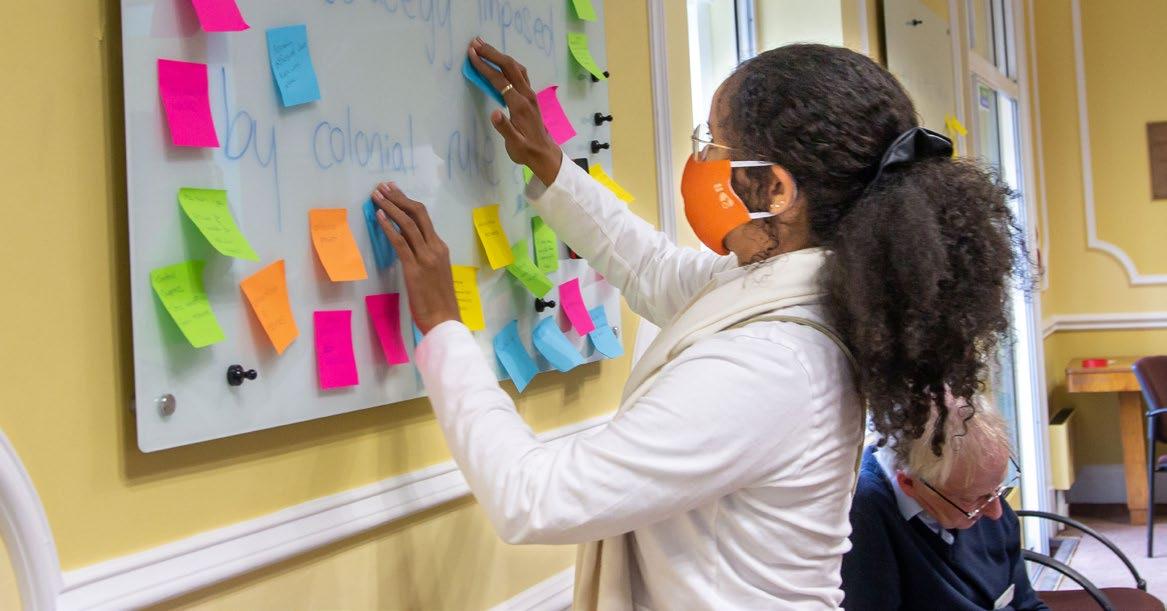
11

12
Reports
During the year we published three reports generated from earlier conferences:
• Climate Futures: Youth Perspectives was launched at a hybrid event at Cumberland Lodge on 16 September 2021, in advance of the Pre-COP26 Conference in Milan, Italy, and the 2021 UN Climate Change Conference in Glasgow (COP26).

• Towards Justice: Law Enforcement & Reconciliation was launched at a hybrid event at New Scotland Yard, London on 1 February 2022.
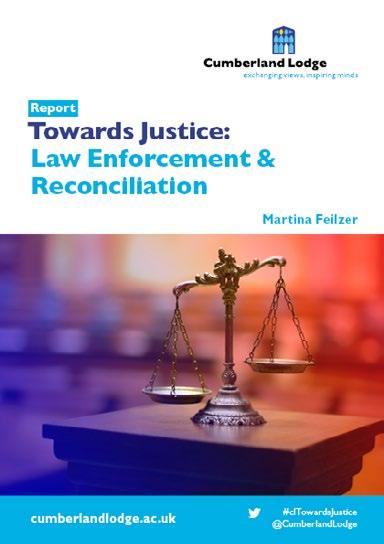

• Practitioner Responses to Child Trafficking: Emerging Good Practice was launched at a hybrid event at Deloitte, London on 11 April 2022.


13
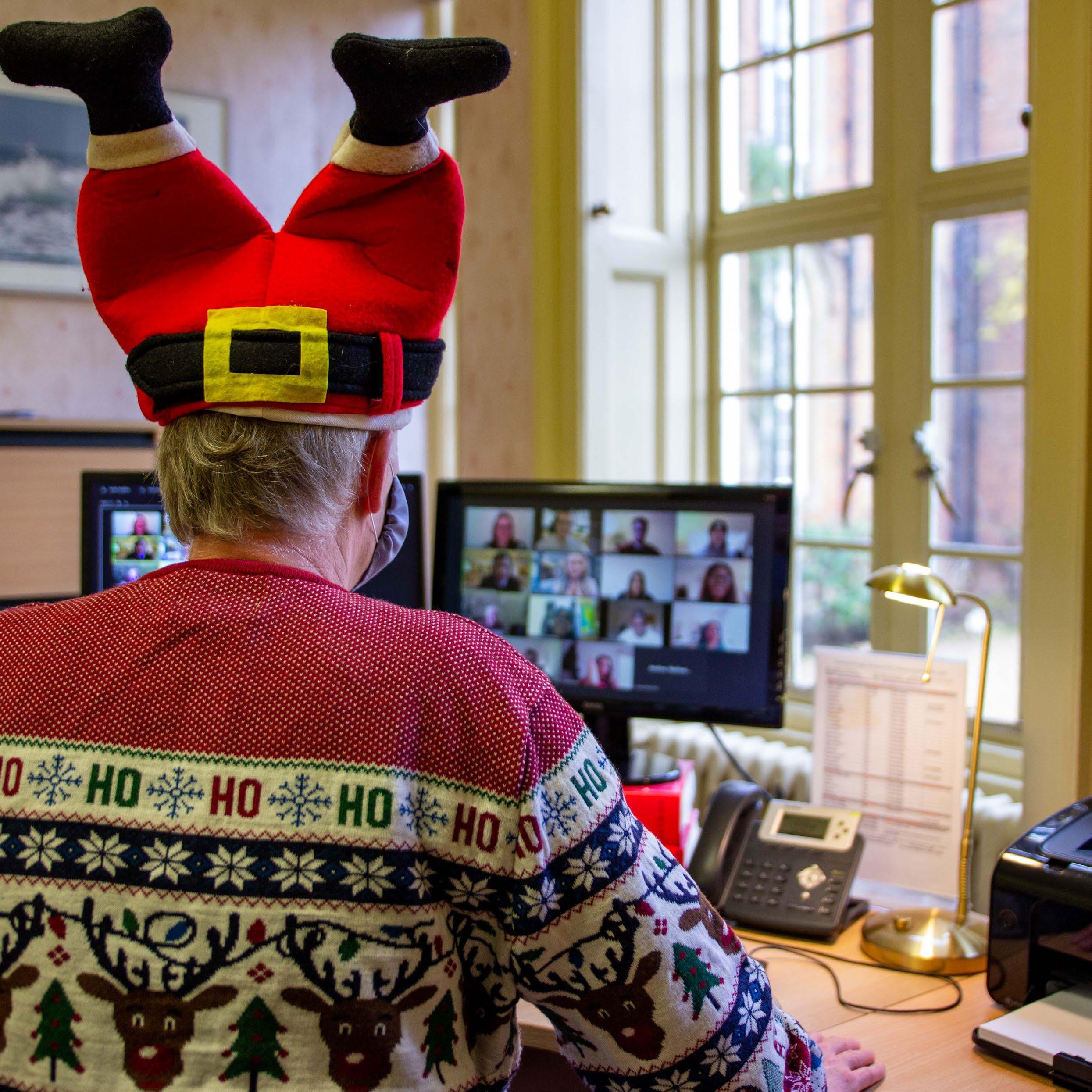 Virtual Commonwealth and International Student Christmas Conference 2021
Virtual Commonwealth and International Student Christmas Conference 2021
Webinars and podcasts
Dialogue & Debate webinars

Throughout the pandemic, we held regular Dialogue & Debate webinars. With the reintroduction of in-person events, we reduced the frequency of these webinars, which we now hold on an occasional basis. This change is apparent in the list of webinars held in 2020-21:
• The Social Impact of Sport, 1 September 2021
• Schooling and Inequality, 6 October 2021
• Beyond Tokenism, 3 November 2021
• Women in Leadership, 6 March 2022
Unfortunately, the 2021 Commonwealth and International Students’ Conference had to be cancelled due to COVID-19. It was replaced by a webinar held on 21 December 2021 to discuss the experience of students studying at university during the pandemic.
Life Perspective podcasts
In 2022, we launched a new inter-generational podcast series, Life Perspectives, in which current and past Cumberland Lodge Fellows discussed issues of mutual interest with leading practitioners in their fields. During the year we released four episodes:

• Youth in Leadership, Dr Angelika Love and Dr Margaret Heffernan
• Policy and Public Life, Hannah Phillips and Lord (David) Anderson of Ipswich
• Ethnicity & Religion in Recruitment, Samir SweidaMetwally and Dr Valentina di Stasio
• Autism and Spirituality, Henna Cundill with Dame
Stephanie Shirley
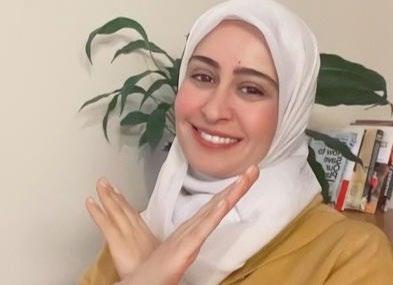
 Alex speaking at the Shaping Social Mobility conference
Alex speaking at the Shaping Social Mobility conference
Back in March 2022, I attended the Shaping Social Mobility: Education and Employment conference at Cumberland Lodge. The conference provided an opportunity to engage with a rich array of stakeholders, working to level the playing field for young people from communities where opportunities have been withheld due to their socioeconomic circumstance. As someone who works to promote equitable access to, through, and beyond, Higher Education, I was particularly interested in the role of universities within this space. Although universities historically have been very interested in examining the socio-economic background of their student-intake, there has been little appetite to make the same considerations in relation to their staff. Often universities are large employers, however there has seemed to be little inclination to examine the socio-economic diversity of their staff in relation to how representative they may be of the communities they serve.
Such circumstances have led to a situation where the responsibility to “change”, “adapt” and “adjust” has historically been placed squarely on the shoulders of the student. It has meant that little recognition has been given to the role of organisational culture, and its implications for students from working-class backgrounds on their sense of belonging within the institution.
At the conference I bumped into Sarah Atkinson, Chief Executive of the charity the Social Mobility Foundation. As part of their work, they run a national index which captures the socio-economic diversity of staff in large companies. Hundreds of organisations such as HMRC, KPMG and the BBC are members. However, to date there are no entries into the Social Mobility Employers Index for Higher Education providers.
Following an initial conversation, we sought to change that. In the intervening months both myself and Sarah have written articles on the subject for the national
Case study: Alex
Higher Education news outlet WonkHE, calling for universities to start collecting socio-economic background data for their staff.
In February 2023, we convened a roundtable to raise the profile of the issue in London. Featuring university vice chancellors, the Director for Fair Access at the Office for Students, and key stakeholders from organisations such as UK Research and Innovation, it bought together leaders to discuss possibilities for actionable change.
Whilst these discussions are still ongoing, it is our hope that in the coming months we can develop a toolkit to support universities in capturing the socio-economic background data of staff and entering into the Social Mobility Employer Index for 2024. On the surface this would be a comparatively small change for universities to make, but it has the power to drive meaningful progress in increasing socio-economic diversity amongst Higher Education workforces across the country.
Without the Lodge acting as a convening force around the issue of social mobility in education and work, this simply would not have happened.
Dr Alex Blower was a Cumberland Lodge Fellow 2018-20. Alex now works as Access and Participation Manager at Arts University Bournemouth.
17

 Dan, pictured at Life Beyond the PhD 2022
Dan, pictured at Life Beyond the PhD 2022
I’m at the end of my third year of my PhD studying climate change, attending a conference during the hottest summer on record. Feels topical.
Every year, Cumberland Lodge’s ‘Life Beyond the PhD’ conference brings together PhD students across a range of disciplines to its historic halls. They share their experiences, develop transferable skills, and answer the hardest question about their research: “So what?”. I’ll reflect on “So what?” later on and start with my thoughts going into the conference. What do I get out of this? Some communication skills, navigating the job market etc. That’s what you think of when you read the term “transferable skills”. Standard buzz-term.
When I walked into Cumberland Lodge I was met with an exquisite ex-royal residence which, on the face of it, embodied everything I believe to be wrong with academia. A “rich old White boys’ club”. Even knowing the ethos of the Lodge, it’s hard not to have doubts when you’re faced with multiple grand pianos. I could not have been more wrong. I entered one of the most diverse spaces I have ever seen in academia. Diverse in age, gender, discipline, ethnicity, etc. If we are the future of academia, then the “rich old White boys’ club” is finally coming to an end. I don’t think I’ve ever felt so comfortable in an academic space. What a great start.
On to the week. We started with excellent keynotes that set the scene of what we could do with our PhDs.
As a self-declared political geek, you can imagine my excitement when Dr Patricia O’Lynn, MLA for North Antrim and former Cumberland Lodge Fellow, stepped onto the stage. She told us how research skills transfer into evaluating policy. Given the political turmoil of the last few years, wouldn’t it be better if we had some more MPs with PhDs?
The days that followed met the high expectations set on the first. We worked on presentation, written, and digital
Case study: Dan

communication skills. I was over the moon when I was told I’d make a great podcast host. (I styled myself on the fantastically queer Jonathan Van Ness – can you believe?). In the final task, I then found myself in the role I was born to play: in charge of WASH in a humanitarian challenge (Water, Sanitation and Hygiene for those unfamiliar). Given I had delivered an impassioned twominute presentation on why I love cleaning as part of the week, it felt like a natural fit. What a success!
So let’s come back to that question: “So what?” Well, in this week I felt a renewal. I spent the week talking to people doing such a diverse set of research. I knew I loved climate research but this week I was shown that when asked “So what?”, we all had the same cheesy answer: to make people’s lives better.
I want to thank the organisers for bringing me back to that and would whole-heartedly recommend this week to any researcher. No regrets.
Dan Parkes is a PhD researcher in the Department of Geography at Royal Holloway, University of London. Dan’s research is focused on looking at the cause and structure of abrupt climate change events. He attended our 2022 Life Beyond the PhD conference.
19
Quire Voices, July 2022

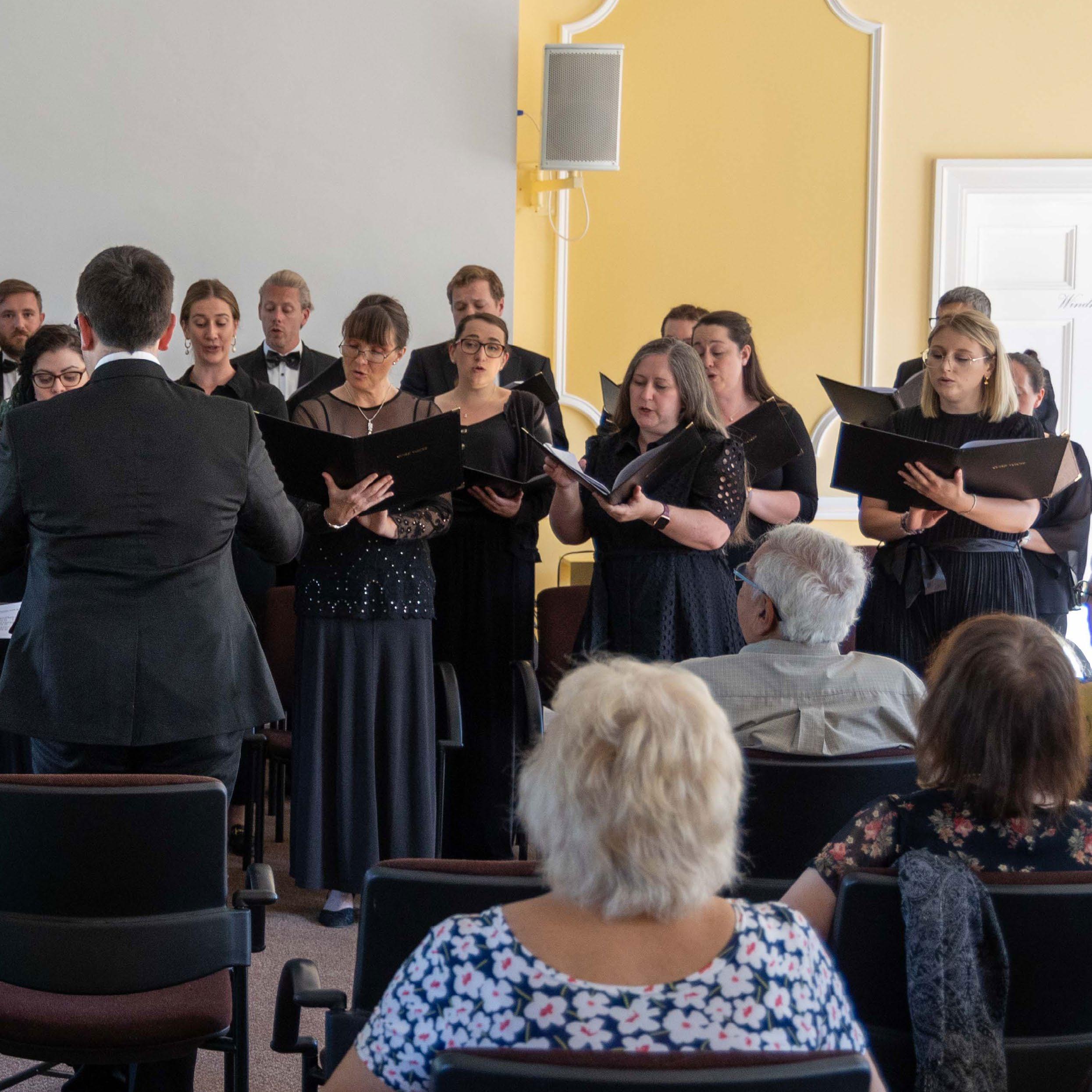
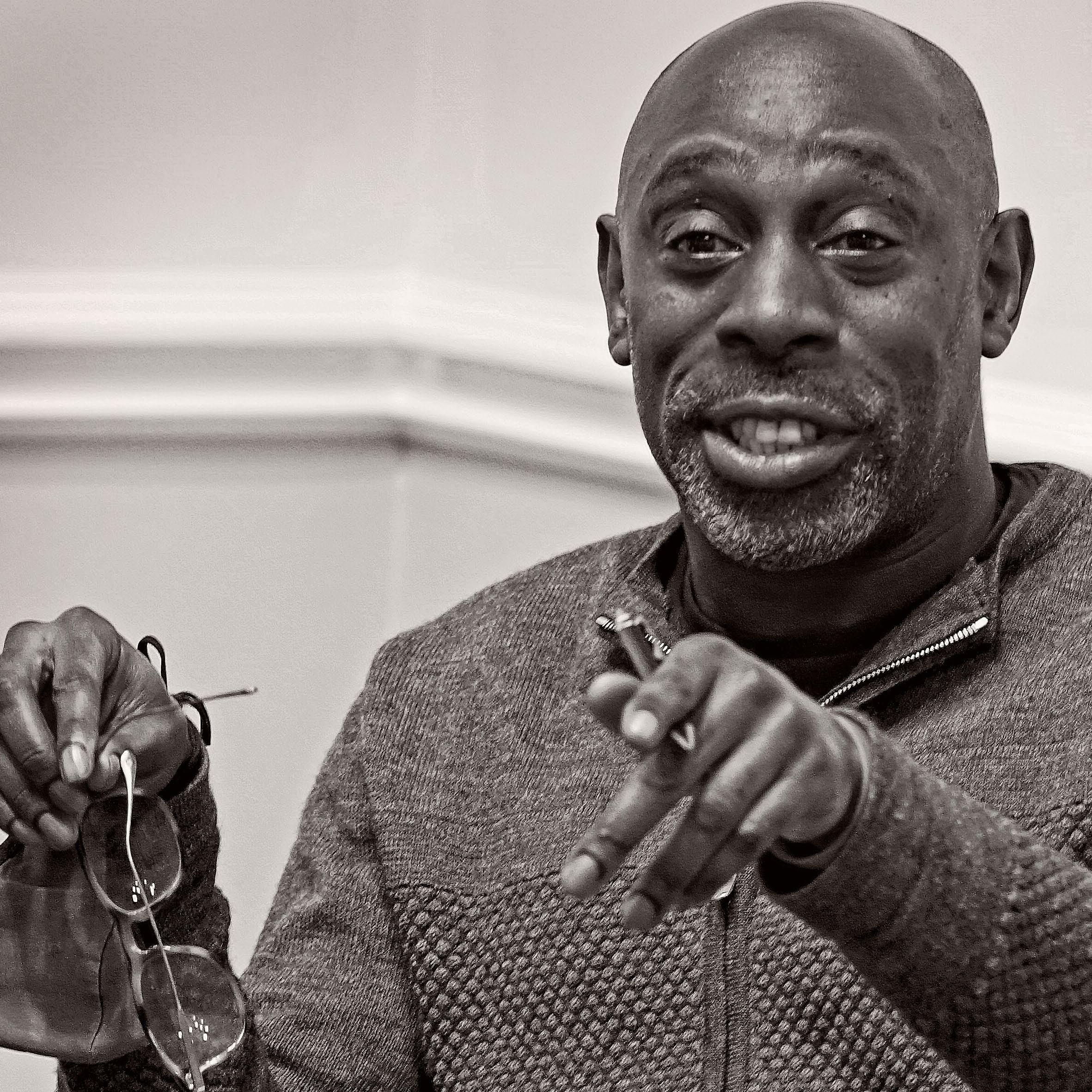 Shakespeare Retreat, January 2022.
Shakespeare Retreat, January 2022.
22
Photo by Chris Towler
Public events
Cultural events
In addition to our Programme events, we continue to hold educational and cultural events that are open to the public.
Windsor Festival
In September 2021, we continued our long-standing relationship with the Windsor Festival with a discussion with Simon Heffer as editor of Henry ‘Chips’ Channon: The Diaries 1938-1943.
Shakespeare Reading Retreat

Our Shakespeare Reading Retreat on Othello, postponed from 2021, took place in January 2022. Our regular contributors Dr Rowan Williams, Sir Stanley Wells, Dr Paul Edmondson and Dr Amanda Piesse were joined by Shakespearean actor Andrew French (pictured left).
Cumberland Conversations
During the year, we held two Cumberland Conversations. Isabella Naylor-Leyland joined us to discuss Alathea FitzAlan Howard’s The Windsor Diaries, in November 2021.

In January 2022 our former Principal Alastair Niven spoke about his memoir In Glad or Sorry Hours. This followed the dedication of revamped archive in honour of Sir Eric Anderson and the launch of a 75th anniversary exhibition.

23
Quire Voices, July 2022

Special events
Moot Court

In February 2022, we held a Moot and fundraising dinner in honour of our former Visitor, the late Sir John Laws. In Regina v Billy Goat 1, leading barristers Kirsty Brimelow KC and Simon Myerson KC teamed up with sixth form students from the social mobility charity Big Voice London for an appeal court hearing following one of the Billy Goats Gruff’s conviction for manslaughter after his encounter with a troll. The (successful) appeal was heard by the Rt Hon Lord Justice Bean, the Rt Hon Lady Justice Whipple, and Her Honour Judge Anuja Dhir KC.
Zutshi-Smith Symposium
In May 2022, we partnered with the University of Bristol to deliver its Sixth Biennial Zutshi-Smith Symposium on the topic ‘Believing in the University: freedom, inclusion and academic citizenship’. Held in Bristol, the event was chaired by Cumberland Lodge Visiting Fellow Dame Sara Thornton. Quire Voices Platinum Jubilee concert

To mark the Platinum Jubilee of our Patron, Her Majesty The Queen, in July 2022 we hosted a performance of Music of the Royal Court sung by Quire Voices.

25
 Martha, Cumberland Lodge Fellow 2020-22
Martha, Cumberland Lodge Fellow 2020-22
People
It is the contribution of so many people that makes Cumberland Lodge such a vibrant organisation with an exceptional reputation for its hospitality. We benefit from both the dedication of those involved with us over many years and those who bring fresh ideas and new skills and experience into the mix.



Trustees
Over the past year, we said farewell to three trustees: Simon Pearce (Treasurer), Paul Hampden-Smith (Chair of the Audit Committee), and Baroness (Jill) Pitkeathley (Vice-Chair), all of whom not only completed their two five-year terms on the Board but kindly continued for an extra year to help us through the pandemic. In their place, we have welcomed Stephen Harvey, David Matthews (Treasurer) and Ingrid Tennessee. John Lotherington has also taken on the role of Vice-Chair of Trustees.
Staff
Among the Senior Management Team, we said farewell to Linda Webber (Finance Director) and Helen Taylor (Communications Director). We welcomed Mike Durham (in the reconfigured role of Chief Operating Officer) and Nicola Hine (Communications Manager).
Volunteers
We continue to benefit from the help of volunteers, and are grateful to Elias Kupfermann, Katherine Saunders and Mimi Markham for their work on the archive and to Jessamy Hadley and Linda Howell for their work on the Library. We are grateful, too, to Jessamy for curating our 75th anniversary exhibition and the display in the main corridor, and to Elias (who sadly passed away in December 2022) for curating the exhibition on Princess Christian in the Tapestry Hall.
27
 Cumberland Lodge Fellows 2019-21
Cumberland Lodge Fellows 2019-21
Fellowships
The Cumberland Lodge Fellowship offers doctoral students who are firmly committed to promoting social progress the chance to set themselves apart, by deepening their understanding of pressing societal issues from a cross-sector perspective, and developing valuable skills in public engagement, networking, communication and interdisciplinary working.



Every year in the spring, nine Cumberland Lodge Fellows are selected through a competitive application that is open to doctoral students from universities and higher education institutions across the UK. A tenth is nominated by the Council for At-Risk Academics, which supports international academics who are at risk of persecution, conflict or violence in their home countries to study or work in the UK. Our Amy Buller PhD Scholar, who is supported financially to complete a PhD at Royal Holloway, University of London, also becomes a Cumberland Lodge Fellow for the duration of their threeyear Scholarship.
As we said farewell to our 2019-2021 cohort of Fellows, going into this year we welcomed our 2021-2023 cohort: Ellen Bristow (Cardiff University), Julia Buzan (LSE), Henna Cundill (University of Aberdeen), Joshua Ettinger (University of Oxford), Hannah Gumble (UCL), Andrew Marks (University of Edinburgh), Callum O’Malley (University of Kent), Scott Kaba Matafwali (London School of Hygiene and Tropical Medicine), Nour Nashed (University of Sussex), and Rachel Newell (Queen’s University Belfast). During the year, Antonin Ficatier (2020-22 cohort) represented Fellows on the Board of Trustees.
A full list of all of the Fellows we worked with during this academic year can be found on the final pages of this report.
29

30
In April 2019, I was invited to an interview for a Cumberland Lodge Fellowship position.
At that time, I knew very little about the broad and amazing work the Lodge is undertaking in this country. I was just an active first year PhD student who was trying to use all opportunities UK studies can bring to her. After getting the place and becoming one of 10 people in that year’s cohort, I felt honoured and surprised that I, a filmmaker, would be included in a group of amazing young researchers from UK universities coming from all around the world and undertaking studies on so many important topics. I always had a strong belief in the impact and therefore the responsibility of cinema. I was excited that my attitude was understood and shared. My experience of being a Cumberland Lodge Fellow helped to broaden my horizons and taught me a lot. Taking part in the debates and conferences; discussing challenging questions; helping create a curriculum for schools that would teach young people to have open conversations about our past, present, and future; learning new things that are outside of my research expertise but so important for me as a global citizen – all of this was a truly life-changing experience. I had so many unforgettable encounters during my two-year journey: caring and welcoming staff of the Lodge, other fellows from multiple cohorts, honorary Lodge guests, and even Her Late Majesty Queen Elizabeth II. The Lodge, with its hardworking team, has an impressive ability to bring together people from so many different backgrounds and make them all feel welcomed and safe to express their views. One of the highlights of my two-year experience was being a guest speaker and helping to organise a webinar, “Dialogue & Debate: Film and Social Impact”. I was privileged to be able to talk with my favourite British film director Ken Loach, who created so many socially meaningful films and inspired me to always think about the social impact when I create my films. Another once-in-alifetime experience I had thanks to the Fellowship scheme
Case study: Anna

was meeting with Her Late Majesty Queen Elizabeth II and being able to tell her about my research and my films. This was a great inspiration for my future works!
Cumberland Lodge not only allowed me to join many truly inspiring events within their grounds, not only opened my eyes to many contemporary problems I was not thinking about, and taught me to talk on difficult topics, but also supported me with the Personal Development Grant. I used it as a part of the budget for my PhD research short film Transgressing, which allowed me to finish a complicated film production during challenging pandemic times and create a socially meaningful short film that is now successfully travelling around the world with six awards and more nominations. The audience response to the topics and questions raised by the film has been amazing! Some of the screenings generated more than hour-long discussions with the viewers. My Fellowship was an eye-opening experience and will undoubtedly have a long-lasting effect on my academic and professional life.
Anna Kumacheva (pictured left at our 2022 Open Day) was a Cumberland Lodge Fellow 2019-21. Anna’s short film, Transgressing, was produced as part of her PhD at the University of Lancaster.
31
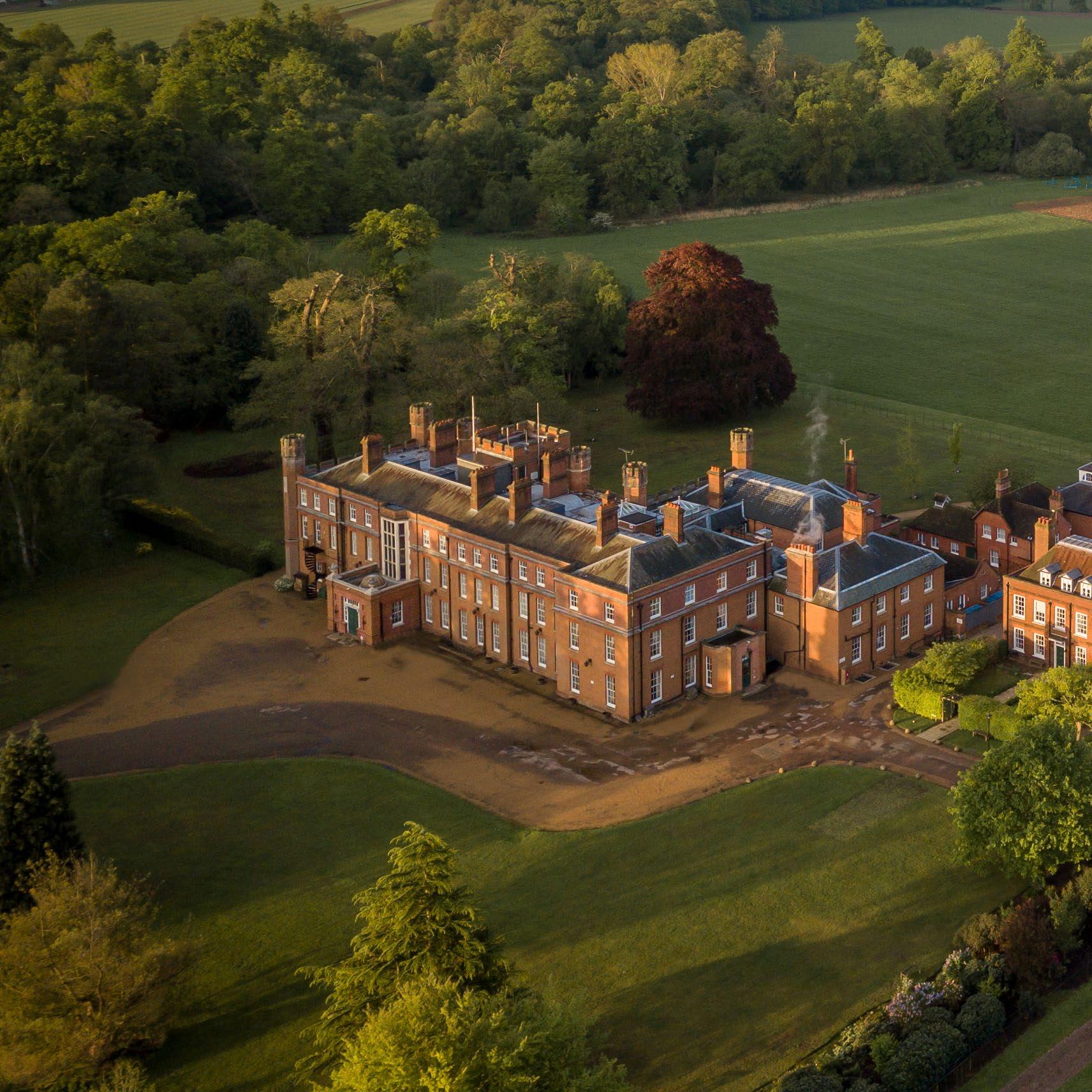


34
Every year, we welcome a broad spectrum of organisations and individuals to the Lodge, ranging from charities to businesses, university departments and legal and medical trainees.
Our Grade II listed facilities are available to hire throughout the year for conferences, meetings, training courses, away-days, retreats and private events and celebrations. Tucked away in the heart of Windsor Great Park, yet close to major train, motorway and air connections, Cumberland Lodge offers visitors the time
Our venue
and space for deep reflection, creative thinking and collaboration. Our event spaces cater for groups of up to 120 people on site, with remote participation also available.
Number of guest events hosted in 2021-22 by sector
35
Charities 32 Cumberland Lodge Programme 12 Corporate 22 Inns of Court 9 Medical 54 Professional 84 Special events 10 University groups 55 Charities Cumberland Lodge Programme Corporate Inns of Court Medical Professional Special events University groups Number of events: 278* Number of organisations/companies: 131
*includes both commercial and charitable events

36
Charitable events
An important aspect of our charitable work is providing facilities for educational activities for visiting groups. These fall into three main categories:

• study retreats for university students (which can include discussions on topical ethical issues led by Cumberland Lodge staff)

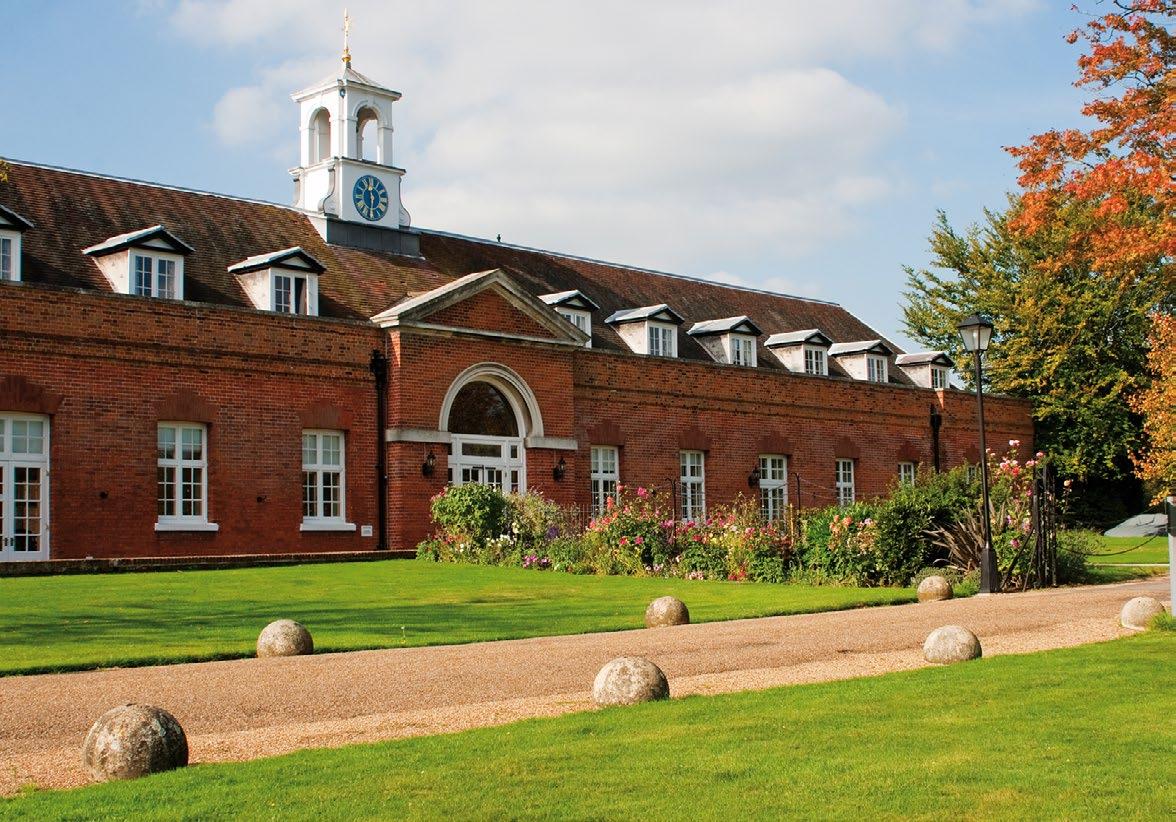
• advocacy training for trainee barristers from all four Inns of Court
• continuing professional development for doctors. Over the past year, 55 student study retreats were held at Cumberland Lodge, involving 2,040 participants; there were nine advocacy training weekends for the Inns of Court, with 633 participants; and 53 medical training events, with 1,741 participants. This means that, in total, 117 charitable events were held at Cumberland Lodge over the past year outside our own Programme, involving 4,940 participants.
As well as the Inns of Court, external organisations with whom we work on a regular basis include Health Education England, West Middlesex Hospital, London North West University Healthcare NHS Trust, University College London, London School of Economics (LSE), Imperial College London, King’s College London, Queen Mary University of London, University of Bristol, University of Warwick, University of Hertfordshire, and the Association of Commonwealth Universities.
37



38
In one sense, some of our stay at Cumberland Lodge did feel like a weekend away with friends, complete with morning yoga, ABBA karaoke, and vegetarian dining (the food, prepared by a British Algerian chef, was impeccable). In another sense, however, it was nothing like anything I’d ever experienced before.
Firstly, we had the absolute pleasure of having our sessions led by Sir Mark Lowcock, former head of the United Nations Office of Coordination of Humanitarian Affairs. On our first evening, we had an informal, fireside chat where we were able to ask Sir Mark our most pressing questions about humanitarian work and some of the key take-aways he learned from such an important and prestigious role. We were all furiously scribbling notes as he imparted his wisdom; something I especially took away from that night was the importance of remembering who humanitarian work is for.
On Saturday and Sunday, we worked on simulation exercises, the first outlining a scenario of a made-up country at war and the neighbouring country receiving those displaced due to the conflict. We were broken into teams and all given roles and background information – motivations, concerns, and other important details. These ranged from high-ranking officials to the refugees themselves. The simulation was to put them all around the same table to discuss what should be done about the crisis at hand. It helped us to realise what sort of conversations take place around each humanitarian event, what arguments might come up, and how we can keep the humanity of refugees at the heart of this important work.
On Sunday we trekked out to Windsor Great Park to scope out the location of a “new refugee camp” we would be constructing. Again, we divided into teams to see who could come up with the “best” solution. Throughout the discussions, “actors” pretending to be anything from funding sources to distressed refugees, and even IKEA pitching temporary housing structures,
Case study: Courtney
would interrupt and demand attention. We know the importance of some things instinctively through the courses we undertake in our degree – women need special protections, children need to be educated, sturdy shelters are preferable to tents. But where is the money and support coming from? What is the highest priority when refugees are already arriving, and you are still planning? How do you prioritise the many different needs within a diverse group of refugees? There are so many moving parts, so many things we would not have even thought of unless we had been shown the intricacies through these simulations.
What I was able to observe and participate in quite clearly this weekend, was 40 young, passionate individuals who care, who are dedicated and driven to helping the earth and the people on it, in whatever way they can. Perhaps more than anything, what this weekend away at Cumberland Lodge gave me was hope. When the future of the world is in the hands of people who care so deeply and genuinely, it is bound to become a little better.
Courtney Bateman, an MSc International Development and Humanitarian Emergencies student, visited Cumberland Lodge in January 2022 as part of a weekend retreat organised by LSE.

39
 Statesmanship and Religious Freedom seminar, July 2022
Statesmanship and Religious Freedom seminar, July 2022
As the restrictions imposed during the COVID-19 pandemic eased in 2021-22, we were pleased to see our conference trade returning rapidly towards normal levels.
Over the previous two years our income-generating activities had been severely impacted by the pandemic and the lengthy closures that were necessary. Thanks to a careful and committed approach from our team, we were quickly able to begin welcoming
Financial report
groups and guests back to the Lodge with the warmth and hospitality they have come to expect from us. We are grateful to all our visitors and staff for their cooperation during this time.
Mike Durham, Chief Operating Officer

Total income £2,742,473
Donations and legacies £45k
Charitable activities £1,517k
Other trading activities £1,063k
Investments £97k
Total expenditure £2,350,966
Trading costs £646k
Charitable activities £1,705k
People
45 permanent employees
21 Fellows
11 Trustees
The Cumberland Lodge accounts have been audited and received an unmodified audit report (for the year to 31 August 2022). The accounts have been filed with both the Charity Commission and Companies House. A full copy of the accounts can be obtained from the Charity Commission (charity number: 1108677).
Chart Title Donations and legacies Charitable activities Other trading activities Investments
Chart Title
1 2
41

42
Our sustainability pledge
At Cumberland Lodge, we are committed to reducing our impact on the environment by embedding sustainability practices across all areas of our charitable and trading activity.
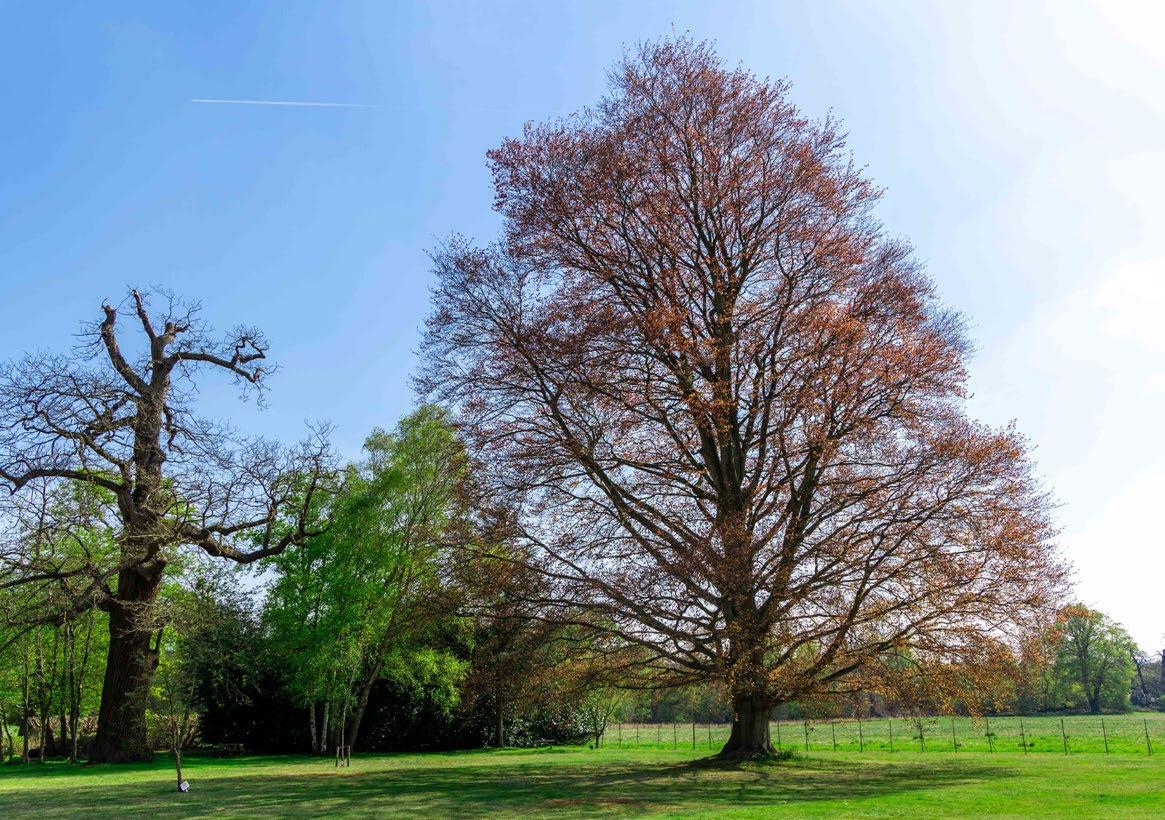


We have set our priorities for this in line with the United Nations’ Sustainable Development Goals and are reviewing our working practices accordingly.
We are focusing on three main areas:
• reducing our carbon emissions
• adopting renewable sources of energy
• improving our waste and recycling rates.
We are drawing up an action plan to move towards carbon neutrality as soon as possible, and ultimately Net Zero Carbon.
Where possible, the results of our efforts will be measured according to verified standards and updates on our progress will be published alongside our annual impact reporting.
43
Life Beyond the PhD, August 2022

As the Chair of Trustees’ foreword highlights, during the year a new fiveyear plan for our Programme has been created and is now beginning to be implemented.

Two key objectives have been agreed that will inform our work for the foreseeable future. The primary objective is “to nurture young people to be ethically minded thought leaders” and the secondary objective is to “build a movement for social progress”.
What these mean in practice is to ensure all that we do provides opportunities for young people to engage with challenging issues with an ethical dimension, and as many opportunities as possible for long-term involvement with us. To achieve these objectives, we will reduce the number of stand-alone conferences that we organise and introduce cohort programmes that will involve participants making multiple visits for residential events. We are also constructing an online “community engagement platform” and online learning capabilities to enable us to involve people across the world in our activities on an ongoing basis.
As we begin to shape our future Programme, there are three areas on which we intend to focus. The application of the rule of law and its relationship to democracy raises many ethical questions in the UK and globally, and this will be the topic for our first cohort programme, with a focus on Commonwealth countries. We also intend to reintroduce our previous cohort programme on Freedom of Religion or Belief.
The third area we plan to focus on is young people’s attitudes to democracy, in the UK and elsewhere in the Commonwealth. The latter stream of work will take our
Looking ahead
work off-site and, initially, across the UK.
To support these new initiatives, a priority is to enhance our online presence and to develop new income streams – including holding more regular social and cultural fundraising events that will appeal to our Friends and other supporters.
Supporting our work
We are incredibly grateful to all who support our work in harnessing the potential that young people have to promote social progress, and in facilitating intergenerational learning and inclusive dialogue on issues that affect us all.
You can support us by donating using your mobile; text LODGE to 70085, to donate £5 (text charged at £5 plus a standard rate message). Alternatively, please text LODGE 10 to the same number, to donate £10 (text charged at £10 plus a standard rate message), or change the amount you would like to give, accordingly.
Please contact us to find out more about how you could help to support our work, by emailing enquiries@cumberlandlodge.ac.uk, or calling 01784 432316.
With special thanks to our 2021-22 donors:
• Lincoln’s Inn
• The Rt Hon the Lord Lloyd of Berwick, DL
and continued thanks to our Friends.
45
Board of Trustees
Chairman
The Rt Hon the Baroness Prashar of Runnymede, CBE, PC
Vice-Chair
The Baroness Pitkeathley of Caversham, OBE (until July 2022)
John Lotherington
Treasurer
Simon Pearce (until January 2022)
David Matthews
Trustees
Charles Anson, CVO, DL
Jane Furniss, CBE
Alan Gemmell, OBE
Paul Hampden Smith (until January 2022)
Stephen Harvey
Amanda Mackenzie, OBE
JP Rangaswami
Ingrid Tennessee
Chief Executive
Canon Dr Edmund Newell
Visiting Fellows
The Lord Anderson of Ipswich KBE, KC
The Baroness Chakrabarti, CBE, PC
Dame Sara Thornton, DBE, QPM
The Rt Rev and the Rt Hon the Lord Williams of Oystermouth, PC
Professor Tariq Modood, MBE
Sir Stuart Etherington
Honorary Life Fellows
Lady (Poppy) Anderson
The Rt Hon the Lord Lloyd of Berwick, DL
The Rev Canon Professor Richard Burridge
Christopher Mann
Dame Elizabeth Neville, DBE, QPM, DL
Dr Alastair Niven, LVO, OBE
Helen Niven
The Rev Canon John Ovenden, LVO
John Pool
Dr Hilary Richards
Maria Wallis, QPM
Sir Stephen Wall
Cumberland Lodge Fellows
2020–22
Adenike Adewuni, School of Biosciences and Medicine, University of Surrey
Avani Amalya Tandon Vieira, Faculty of English, University of Cambridge
Dareen Assaf, Faculty of Social Sciences and Humanities, Sheffield Hallam University
Martha Beard, Centre for Memory, Narratives and History, University of Brighton
Antonin Ficatier, School of Philosophy, University of Birmingham (Fellows’ representative on the Board of Trustees)
Chandni Patel, Department of Molecular and Clinical Cancer Medicine, University of Liverpool
Hannah Phillips, Department of Social Policy and Intervention, University of Oxford
Neofytos Sakellaridis Mangouras, Faulty of Law, University of Glasgow
Robyn Smith, Department of Life Sciences, Brunel University London
Samir Sweida-Metwally, School of Sociology, Politics and International Studies, University of Bristol
46
2021-23
Ellen Bristow, Centre for Language and Communication Research, Cardiff University
Julia Buzan, Psychology and Behavioural Science, London School of Economics
Helena Cundill, Divinity (Theology), Aberdeen University
Joshua Ettinger, School of Geography and the Environment, University of Oxford
Hannah Gumble, The Bartlett Centre for Advanced Spatial Analysis, University College London
Callum O’Malley, Division of Natural Sciences, University of Kent
Andrew Marks, School of Architecture and Landscape Architecture, University of Edinburgh
Scott Matafwali, Infectious and Tropical Diseases, London School of Hygiene and Tropical Medicine
Nour Nashed, School of Life Sciences, Department of Chemistry, University of Sussex
Rachel Newell, School of History, Anthropology, Philosophy and Politics, Queen’s University Belfast
Shahira Shahir, School of Management, Cardiff Metropolitan University
Siyi Wang, Department of Sociological Studies, University of Sheffield
Amir-Hosseyn Yassari, Department of Life Sciences, Brunel University London Amy Buller PhD Scholar
2020-23
Joshua Rice, Department of History, Royal Holloway, University of London
2022-24
Sarah Bibi, Manchester Institute of Education, University of Manchester
Eleanor Clarke, Department of Psychology, Edge Hill University
John Coggin, Department of Theology and Religion, University of Durham
Basma El Doukhi, School of Social Policy, Sociology and Social Research, University of Kent
Sylvia Ikomi, Department of Education, University of Greenwich
Meaghan Malloy, Institute of Education, Education, Practice and Society, University College London
Nicola O’Donnell, Department of Health Sciences, University of York

47
Cumberland Lodge is a charity that empowers people, through dialogue and debate, to tackle the causes and effects of social division.
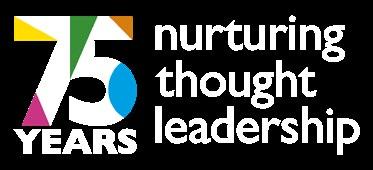

Since 1947, we have been breaking down silo thinking, building cross-sector networks and promoting thought leadership, to support more peaceful, open and inclusive societies.
We host intergenerational conferences, panel discussions, webinars and retreats, alongside a vibrant programme of cultural and educational events for the local community. We actively involve students and young people in all aspects of our work, and run dedicated programmes that nurture their potential as future thought leaders and change makers.
Our Grade II listed facilities are available to hire for residential or non-residential conferences, meetings and special events. Every booking helps to support our charitable work.
Cumberland Lodge

The Great Park Windsor
Berkshire SL4 2HP
cumberlandlodge.ac.uk
enquiries@cumberlandlodge.ac.uk
01784 432316
@cumberlandlodge
Cumberland Lodge is a company limited by guarantee. Company number 5383055

Registered charity number 1108677
© Cumberland Lodge 2022. All rights reserved With grateful thanks to all who have supplied photographs








 Shaping Social Mobility conference, March 2022
Shaping Social Mobility conference, March 2022













 Virtual Commonwealth and International Student Christmas Conference 2021
Virtual Commonwealth and International Student Christmas Conference 2021



 Alex speaking at the Shaping Social Mobility conference
Alex speaking at the Shaping Social Mobility conference

 Dan, pictured at Life Beyond the PhD 2022
Dan, pictured at Life Beyond the PhD 2022



 Shakespeare Retreat, January 2022.
Shakespeare Retreat, January 2022.







 Martha, Cumberland Lodge Fellow 2020-22
Martha, Cumberland Lodge Fellow 2020-22



 Cumberland Lodge Fellows 2019-21
Cumberland Lodge Fellows 2019-21
















 Statesmanship and Religious Freedom seminar, July 2022
Statesmanship and Religious Freedom seminar, July 2022













